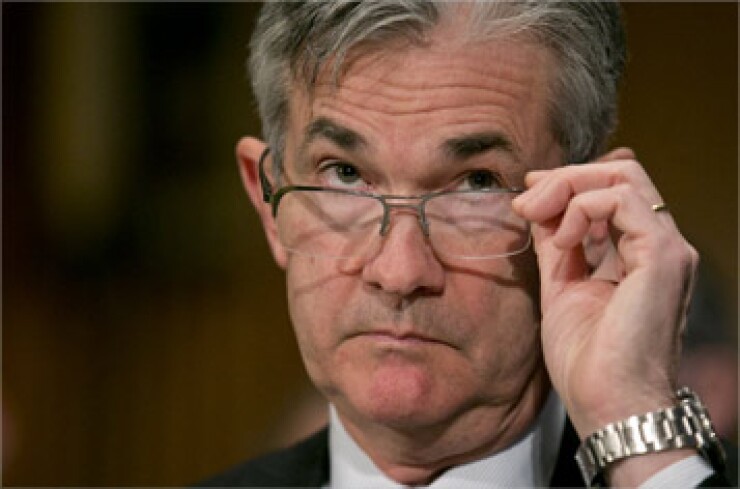
SAN FRANCISCO — Federal Reserve Board Governor Jerome Powell said Monday that while the Fed must "moderate" its large-scale asset purchases at some point, it should do so only "gradually" and "slowly" as demand strengthens.
The timing of "tapering" is "necessarily uncertain" because it depends on how the economy evolves, he said in remarks prepared for delivery to the San Francisco Federal Reserve Bank's semi-annual Asia Economic Policy Conference.
Addressing concerns about how eventual Fed "tapering" of its $85 billion monthly bond buying will affect capital flows, interest rates and asset prices in emerging market economies (EMEs), Powell said reduced "quantitative easing" and eventual hikes "need not be disruptive."
For one thing, "tightening will in all likelihood occur in the context of a more firmly established economic recovery in the United States so that any adverse effects on EME financial conditions should be buffered by the beneficial effects of higher external demand," he said.
What's more, Powell said that "on the whole, EMEs exhibit greater resilience than they did in prior decades, reflecting, among other factors, more flexible exchange rates, greater stocks of international reserves, stronger fiscal positions, and better regulated and more conservatively managed banking systems."
Powell gave no sense of urgency about tightening monetary policy or even making it less stimulative.
"Monetary policy in the United States is likely to remain highly accommodative for some time, as our economy fights to overcome the remaining headwinds from the global financial crisis," he said.
"As our economic recovery continues, however, the time will come to gradually reduce the pace of asset purchases and eventually bring those purchases to a stop," he continued.
But he added that "the timing of this moderation in the pace of purchases is necessarily uncertain, as it depends on the evolution of the economy."
Responding to a question, he said the Fed should reduce stimulus "gradually" and "slowly" and "only do that as demand does strengthen."
Speaking about advanced countries' monetary policies more broadly, Powell said "policymakers should move gradually to restore normal policies only as their economic recoveries are more firmly established, consistent with their mandates."
He also emphasized that "policymakers should communicate as clearly as possible about their policy aims and intentions in order to limit the odds of policy surprises and a consequent sharp adjustment in financial markets in response."
He said he and his colleagues on the Fed's policymaking Federal Open Market Committee "are committed to just such an approach."
Addressing a group that included numerous officials of Asian central banks, Powell dealt empathetically with complaints from a number of EMEs that low U.S. interest rates have put upward pressure on their currencies and asset prices and hurt their exports.
And he said that "for the Federal Reserve to fulfill its dual mandate of price stability and maximum employment, we must take account of these international linkages."
However, for the most part, Powell echoed past assertions by Fed Chairman Ben Bernanke and Vice Chairman Janet Yellen that the global benefits of easy U.S. monetary policy have exceeded its costs and that EMEs themselves have a responsibility for adjusting their monetary, exchange rate and credit rate policies accordingly.
"Neither conventional nor unconventional monetary policy actions are shocks that come out of the blue," he said. "Instead, they are the policies undertaken by central banks to offset the adverse shocks that have restrained our economies."
"Thus, any spillovers from monetary policy actions must be evaluated against the consequences of failing to respond to these adverse shocks," he said.
Powell acknowledged that low interest rates in the U.S. and other advanced countries have led to portfolio shifts in search of higher yields abroad and to "carry trades." But he maintained that capital inflows into EMEs have also reflected faster growth and better investment opportunities in those nations.
He said "the role of monetary policy in driving capital flows and the effects of those flows on EMEs should not be overstated."
Denying that the Fed and other major central banks have pursued "beggar-thy-neighbor" policies, Powell said their easy money stances "do not undermine exports from EMEs."
"Even if advanced economy monetary policies were to put upward pressure on EME currencies, the consequent drag on their exports must be weighed against the positive effects of stronger demand in the advanced economies," he said.
Powell, cited Fed research purporting to show that "these two effects roughly offset each other, suggesting that accommodative monetary policies in the advanced economies have not reduced output and exports in the EMEs."
Powell also acknowledged that large capital inflows into EMEs "may foster asset price bubbles and a too-rapid expansion of credit," and he said "these are serious concerns."
However, he added, "while the picture is a mixed one and some markets show signs of froth, indicators of financial stability do not seem to show widespread imbalances."
He said that the most egregious case of explosive credit growth is China, which he said "does not seem to be the result of accommodative monetary policies in the advanced economies."
Powell said Asian EMEs have done much to "bolster the resilience of their banking systems," but added, "Nevertheless, in an environment of volatile global markets, regulators should guard against the buildup of vulnerabilities, such as excessive dependence on wholesale and external funding, declining asset quality, and foreign currency mismatches."
Market News International is a real-time global news service for fixed-income and foreign exchange market professionals. See





